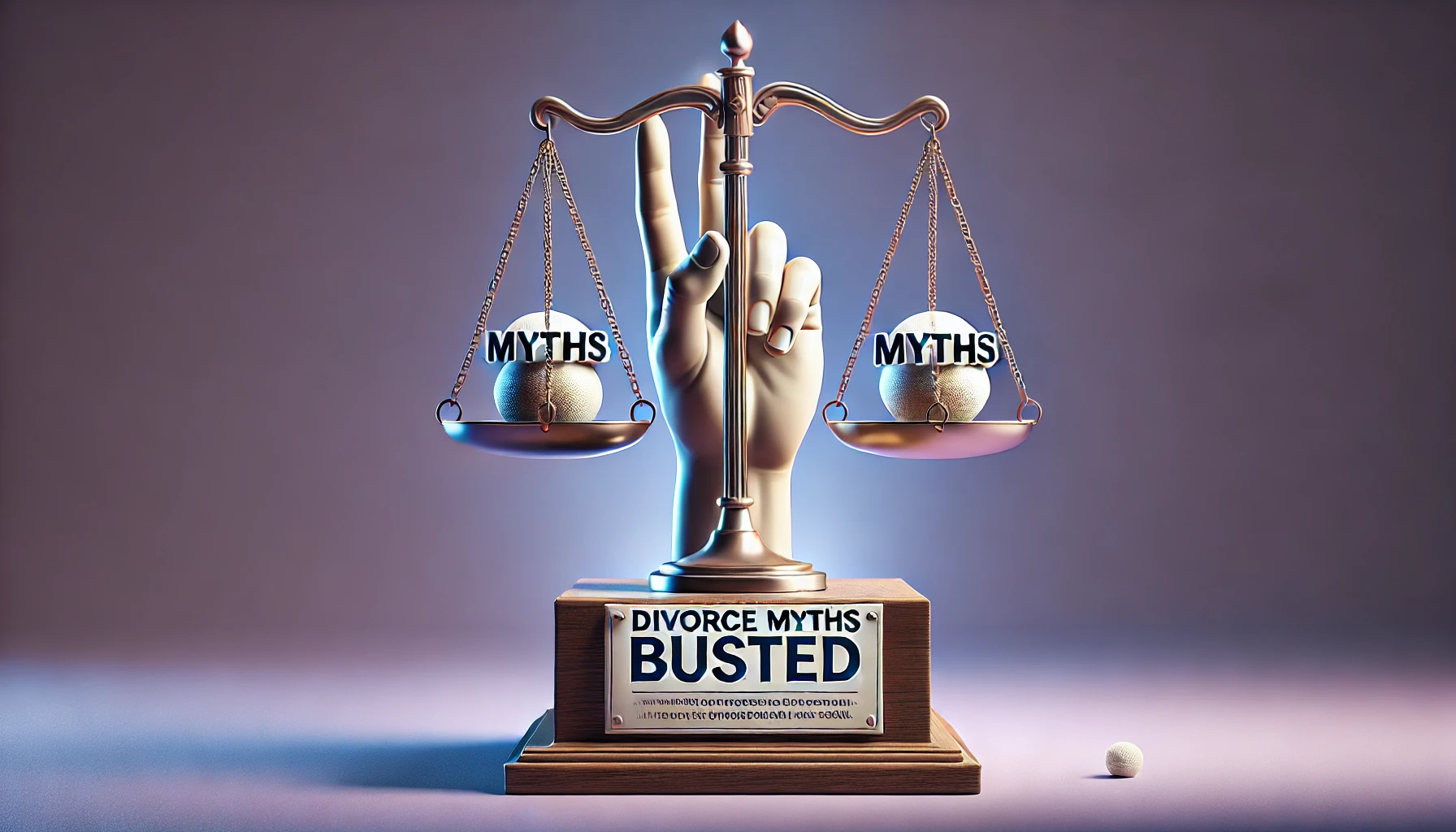Introduction
Top Divorce Law Myths Debunked in Our Future, Divorce is a complex, emotional, and legally intricate process that is often shrouded in misconceptions. With widespread myths circulating about divorce law, many people enter the process with misconceptions that can lead to unrealistic expectations, unnecessary stress, or financial trouble. Understanding the truth about divorce law is crucial to navigating the divorce process successfully. In this article, we will debunk some of the most common divorce law myths and provide a clear, fact-based understanding of divorce in our future.
Myth 1: The “Mother Gets Custody” Rule is Absolute
One of the most persistent myths about divorce law is that mothers always receive custody of children in divorce cases. While it was historically true that mothers were more likely to be awarded primary custody, this is no longer the case in modern divorce law. Top Divorce Law Myths Debunked in Our Future.
The Truth: Courts Focus on the Child’s Best Interest
In 2024, child custody decisions are made based on the best interests of the child, not gender. Courts now prioritize factors like the child’s relationship with each parent, the ability of each parent to provide a stable and loving environment, and the child’s preference (if they are old enough to express one). Joint custody arrangements are becoming more common, with both parents sharing physical and legal custody of the child whenever possible.
Key Factors Considered in Custody Decisions:
- The child’s emotional and developmental needs.
- The parenting abilities of each parent.
- The relationship between the child and each parent.
- The child’s schooling and social environment.
In fact, fathers now have a much higher chance of securing joint custody or even sole custody in cases where they can demonstrate their ability to meet the child’s needs. Top Divorce Law Myths Debunked in Our Future.
Myth 2: You Must Be Divorced for a Long Time Before Remarrying
Another common myth is that you must wait for a long period after a divorce before getting remarried. Some people believe there are legal restrictions or waiting periods that prevent remarriage immediately after divorce.
The Truth: No Legal Waiting Period for Remarriage
Once the divorce decree is final and the court has issued a final judgment of divorce, there is no legal reason preventing you from remarrying, provided all legal matters have been resolved. The myth of a waiting period likely comes from the time it takes for divorce proceedings to be completed, but this time is spent resolving issues such as asset division, custody, and alimony—not waiting to remarry.
However, in some cases, such as when one spouse is entitled to receive alimony or spousal support, remarriage may affect the amount or duration of those payments. It is important to consider the financial implications before rushing into a new marriage.
Myth 3: Fault Always Affects Divorce Outcomes
A widespread myth is that if one spouse is at fault for the breakdown of the marriage—whether through adultery, abuse, or other reasons—it will affect the divorce settlement, including property division, alimony, or custody arrangements.
The Truth: Fault Is Not Always a Factor in Modern Divorce Law
In many places, including most states in the U.S., no-fault divorce laws now dominate. This means that neither spouse has to prove wrongdoing or fault in order to file for divorce. The most common ground for divorce is simply that the marriage is irretrievably broken or that there are irreconcilable differences.
While fault can sometimes influence certain aspects of the divorce—such as alimony or property division in some jurisdictions—most divorce cases today focus on equitable or equal distribution of assets, custody arrangements, and other relevant factors, without the need to prove fault. Fault-based divorces are becoming increasingly rare and often add complexity and cost to the process.
Myth 4: Divorce Always Means Financial Ruin
Many people are led to believe that a divorce will devastate their financial stability, leading to long-term poverty or significant economic struggles. This belief often stems from the potential costs of legal fees, the division of assets, and the possibility of alimony or child support payments.
The Truth: Divorce Doesn’t Necessarily Mean Financial Ruin
While divorce can certainly have financial consequences—particularly if there are significant assets, high alimony obligations, or substantial child support—it does not automatically lead to financial disaster. The impact of divorce on finances largely depends on factors like the length of the marriage, the earning capacity of each spouse, and the nature of the division of assets.
In fact, many individuals find that after divorce, they are able to regain financial independence and rebuild their lives in a way that they could not while married. Proper planning, working with a financial advisor, and focusing on rebuilding your financial portfolio post-divorce can lead to a stable future.
Additionally, in some cases, divorcing couples can negotiate settlements that are financially beneficial or amicable, particularly in uncontested divorces where both parties agree on terms.
Myth 5: Divorce Lawyers Are All About Conflict and Litigation
Another common misconception is that hiring a divorce lawyer will automatically escalate the situation, leading to a contentious, bitter, and expensive court battle.
The Truth: Divorce Lawyers Can Facilitate Amicable Resolutions
While litigation is a common route in contested divorces, the role of a divorce lawyer is not limited to fighting in court. In fact, many divorce lawyers today specialize in collaborative divorce, mediation, or negotiation. These approaches focus on resolving disputes outside of court, with both parties working with their attorneys to reach an amicable agreement on issues like asset division, child custody, and spousal support.
Collaborative law emphasizes cooperation over conflict, and mediation can provide a neutral space for couples to reach a mutually acceptable divorce settlement. This reduces the emotional toll and financial burden of a protracted court battle. Choosing the right legal representation can make all the difference in avoiding unnecessary conflict.
Myth 6: Divorce Will Destroy Your Credit Score
Many individuals worry that getting a divorce will negatively impact their credit score, especially if debts or loans are involved.
The Truth: Divorce Doesn’t Directly Affect Your Credit Score
A divorce decree itself does not directly affect your credit score. However, the financial separation that accompanies a divorce can have an indirect impact on your credit, especially when it comes to jointly held debts. If you and your spouse have joint credit cards, mortgages, or other shared debts, these obligations must be divided during the divorce process.
If one spouse is left with significant debts after the divorce, or if the debt isn’t properly addressed in the divorce settlement, it could result in late payments, missed payments, or collections that can negatively affect both parties’ credit scores.
To prevent credit score issues, it’s essential to carefully review and separate joint accounts before the divorce is finalized and ensure that both parties understand their financial obligations post-divorce.
Myth 7: You Have to Accept Everything in the Divorce Settlement
Some people believe that once a divorce settlement is made, there is no room for modification or negotiation. This myth can cause unnecessary anxiety, especially when a person feels the settlement is unfair or inadequate.
The Truth: Divorce Settlements Can Be Modified or Challenged
While divorce settlements are legally binding, they are not set in stone. In many cases, if there is a significant change in circumstances—such as a change in income, employment, health, or living conditions—either spouse can request a modification to the terms of the settlement. This includes alimony, child support, or even custody arrangements.
Additionally, if there is evidence of fraud or duress during the settlement negotiation, the agreement may be challenged in court. Legal recourse is available if one spouse believes the settlement is unjust or was made under false pretenses.
Conclusion
Divorce law is often clouded by myths and misconceptions, which can cause unnecessary confusion and stress during an already difficult process. By debunking some of the most common myths surrounding divorce, individuals can approach divorce proceedings with a clearer understanding of their rights, responsibilities, and the realities of the legal process. Whether it’s custody, asset division, or financial matters, having accurate information will help ensure that your divorce is resolved as smoothly and fairly as possible.


